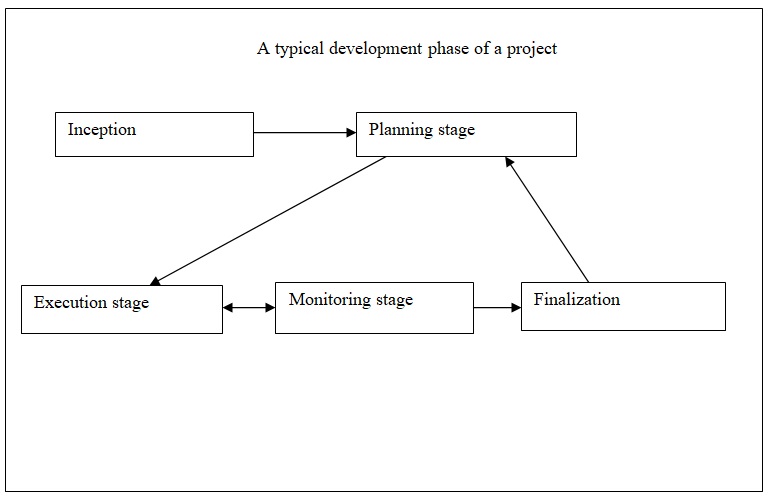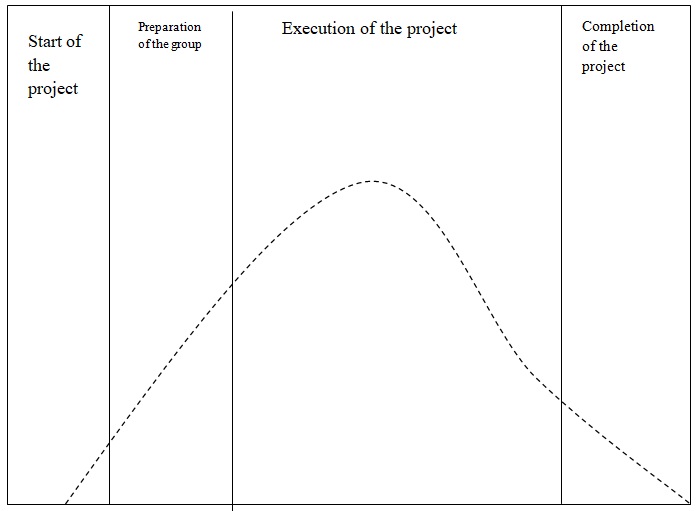Introduction
All businesses utilize projects as a means of translating their plans into actions. Many organizations are project-intensive i.e. they survive through project management as all their tasks are focused towards project completion and success. Examples of such businesses include construction, aerospace engineering which involves the construction of airplanes. Engineering design, general contracting, consultancy business, software engineering among others. Organization in the area of projects is routine as nearly all senior employees have a firm knowledge as they have risen through various positions and the executive recognize the requirements needed in order to succeed in any project. Successful completion of aims is hard though; especially in the current business environment. The gradually more compound business world, progressive technology, global partnerships, traditional variations owing to non uniform development, expenditure demands, innovation, tailored requirements for challenging clients, growing market numbers and stringent guideline legislations.
Several analyses have illustrated that strong business growth or motivated events often invite subsequent hazards in deploying approaches in the management of endeavors. Examples of such risks include:
- Hold-ups owing to unsuccessful project preparation, supervision, harmonization and follow-ups
- Poor grasp of monetary aims due to fruitless capacity organization and human resource operations.
- Client discontent owing to lack of awareness, communications and shareholder administration. In order to understand project management, it is fundamental to fully conceptualize the meaning and the relevance of a project. There are several basic parts that collectively describe the constituents of a project. A project is basically described by the goals and the objectives that define it. In essence a project is normally a short term of enterprise which aims at certain objectives based on the project (Haughey, 2009). More so, a project is normally performed by people who are limited to the aims and the objectives of the project. People involved in a project jointly combine their efforts in order to achieve the goals of the project within the stated deadline. Well planned projects achieve their aim within the bracket of the time line, it is therefore important to set these deadlines and properly define the objectives of the projects in order to execute them successfully.
Project management
A project management body of knowledge can be defined as an overall inclusive description of knowledge within a given scope of a profession. This profession surrounds a management process of a project. In his study (Hupston, 2009) concludes that the combination of the fundamental practice that is accepted in the management fraternity in project management process is a key to the success of the project Project management can also be thought as a discipline of planning and organization of available resources in order to successfully complete a specific goal or objective. A project being a temporary endeavor is normally cohesive in nature as it successfully brings together different people with varied skills to implement a primary objective that defines their union.
Project management approaches
There are several approaches in the management process of a project, they include, agility interactive and phased approach. In his book (Brewster, 2009) mentions that however, a foresight and appropriate consideration should be given to the overall objectives, timeline and the overall cost of the project, this should also consider the participants and stakeholder’s responsibilities and their respective roles.
Traditional approach
A traditional phased approach of projects defines a series of five basic steps that should be completed. These five series of a project approach as follows; the inception stage, project planning stage, the execution process of the production stage, project control and monitoring process, finalization of the project. These are elementary steps that an ideal project should take before completion. This is however not the case in all projects, as earlier defined, all projects are unique and original in their own way. In his research (Lonergan, 2009), concludes that this means that the implementation processes many vary depending on the nature of the project and their objectives. Some projects may require iteration in several steps provided
Gant Chart approach
A Gant chart is specifically a format chart which shows all critical areas necessary for the development of a project. These critical points of a project management process include the project, hiring consultants, procurement and logistics among other necessary components of a project. In his research (Hood, 2005) confirms that the Gantt charts are very useful in project management process because they offer useful information about the overall progress of the entire project to the management of the project. Gantt charts can be structured using a spreadsheet and Microsoft project manager

- Inception– This stage of the project management process marks the foundation or rather the inception stage of the project. It is at this stage that all stakeholders and other people that are responsible for the successful implementation of the project meet. In his book (Bodenhamer ,2004) mentions that they meet and all the relevant details of the project that are paramount to its completion are presented and all the involved parties are allowed to comprehend the details including the goals and the objectives of the project.
- Planning– It is at this stage that the blue print of the project is drawn, the entire group of stakeholder and other relevant parties meet to discuss the fundamental steps necessary and should be followed in the implementation process.
- Execution– At this stage as the name suggest, the people involved in the project realization concentrates on the projects details by working to achieve the projects goal. In his studies (Lehmann, 2009) concludes that It is this stage that determines the usability or rather the chances of the project succeeding and achieving its goal.
- Monitoring– This stage of the project management process is simply evaluation and checking the validity of the results from the execution process. This stage also examines if the intended objectives have been successfully achieved.
- Finalization– This marks the last stage of the project management process, it states that the objectives of the project have been comprehensively achieved and the results can therefore be used to perform relevant duties.
Project integration management
A study conducted by (Shleifer, 2009) concludes that the Project integration process is primarily concerned with the integration process of projects objectives. There are seven processes involves in the process.
- Developing a Project Charter- This is the initial stage of the integration process which states that the projects has officially commenced. It therefore gives the project manager the authority to use organizations resources to achieve the desired projects goals.
- Developing a Preliminary Project Scope Statement –This is the initial high-level definition of a project scope. In his studies (Trevor, 2004) found out that the document therefore defines several aspects of the project which includes products services, appropriate method of approval, strategies laid forward for enhancing necessary changes and control processes.
- Develop the Project Management Plan – This is the integration stage of all subsidiary plans into appropriate management plan. It also includes the entire necessary details fundamental for the successful execution of the entire project, this contains how the project will be executed, managed and probably monitored.
- Direct and Manage Project Execution –This lays out how the process of implementing the plan will be carried out by the involved parties as stated in the initial description of how the work will be carried out.
- Monitor and Control Project Work – This process of monitoring and controlling of projects works requires correct measures of ensuring that the progress is successfully achieved as initially planned.
- Integrated Change Control – This is essentially the alteration control of the project that involves evaluation of all necessary changes requested through relevant authorities.
- Close Project – This is the last stage of the integration process which therefore means that the projects have been successfully completed in an appropriate way.
Project management as a related discipline
Project management body of knowledge is also found to be related closely with other managerial disciplines. The general management knowledge and practice includes several aspects that are paramount in the project execution process. Some these general management knowledge and practice are as follows, planning, organization, staffing, execution process, and controlling of operations. Additionally, control and planning supports disciplines such as computer programming, probability and statistics, logistics and personnel management,
Some of the application areas of knowledge and practice may a times refer to activities that may not necessarily be present across all the projects but rather in some. Some common examples are pharmaceuticals, new product development, and software development among others.
Project management knowledge areas
Some of the project management areas are as follows;
- Project integration management- This project management area is specifically responsible for the coordination of different elements of a project which are project plan development, project plan execution and overall change control.
- Project scope management- The scope management defines all areas of the project which are project schedule, constrains in the budget, outline of the tasks, deliverable resources that are required among other angles. The plan of the management scope has the following details, project plan, work breakdown structure, scope statement and project specification.
- Project time management- Most project managers achieve time management through planning and defining different task at every time, they plan by defining activities, establishing a sequence of activities, estimating resources, estimating activity duration, developing schedule and drawing a control schedule. There are software’s such as the Microsoft project management structure that helps to plan the entire duration of the project with less hustle.
- Project cost management-There are three major areas that succinctly define the entire cost of the project management areas and they are, estimate cost, budget determination, control cost determination. These three areas help to determine whether the expenses are adequately budgeted, control of over expenditure, gain approval for extra-ordinary expenses and financial plan for the project.
- Project human resource management- The purpose of the human resource management in a project is to maximize the use of people who are involved in a project. It achieves this by identifying, documenting and probably assigning project role and responsibilities, and establishing relationships. Staff acquisition is responsible for getting the human resource needed and assigning projects to work on. Team development involves developing necessary skills to enhance project performance.
- Project communication management- In any project communication is paramount; in essence project managers communicate 90 % of the time when they are working on a project. Communication helps in planning, this is achieved through understanding communication requirement of a project stakeholder. Information distribution ensures that relevant information is available in a more reliable and timely manner. The other area of communication reporting.
- Project risk management- This management field deals with possibilities of things going wrong, it is unrealistic not to consider risk involved in the project process. Project risk management is therefore a process of identifying, analyzing, and responding to risk management principles that may be inherent in the project management process. The goal of risk management is therefore to reduce risks in a cost effective way without compromising any important objective of the project.
- Project procurement management-Procurement process mainly involves the contract agreement in the project. In any successful project, there are contract negotiations that should be considered. In procurement management, planning, selection of sources, solicitations process, contract administration and contract closing is essential.
A typical project management life cycle is as follows;

Reference List
Brewster, J. (2009) A Guide to Project Management. Perth, Project Management.
Bodenhamer, D. (2004) Project Management: Utilization and Dependence., New York: Indiana University Press.
Haughey, D. (2009) The Project Management Body of Knowledge. London,Oxford Publishers.
Hood, R. (2005) Management in the 21st Century., San Diego, CA: Clarendon Press.
Hupston, F. (2009). Project Management Body of Knowledge. Bombay, Shah.
Lehmann, F. (2009) Comparison old PMP Exam Test. New York, CRC Publishers.
Lonergan, K. (2009) Project Management. Sydney, Ocean View Publishers.
Shleifer, A, (2000) Importance of Project Management: Strategic Focus, Oxford University Press.
Trevor, L. ( 2004) Successful Project Management. London, Page Limited.
